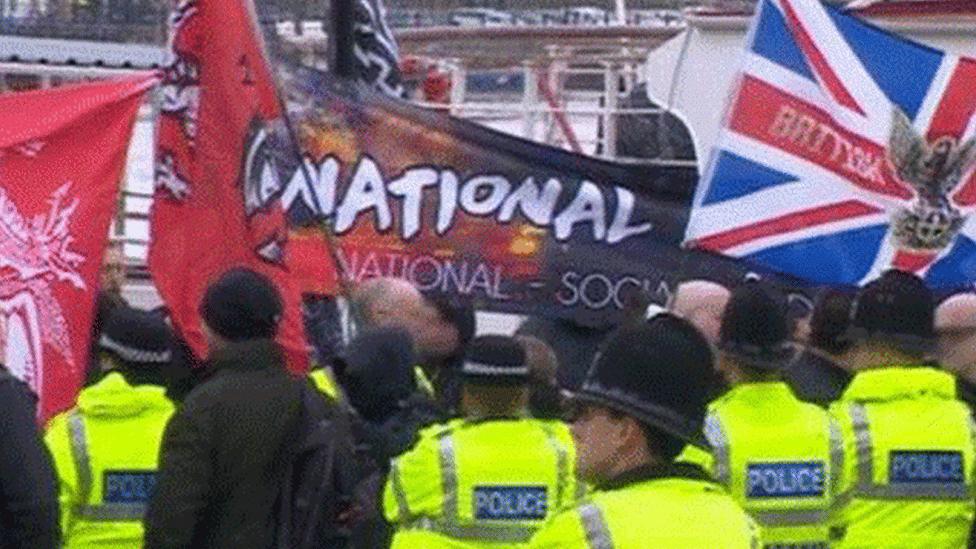National Action ban highlights concern over far right
- Published

Far-right radicalisation is regarded as a growing problem by the authorities. Indeed, in some areas, it is now number one on the list of ideologies for those fighting extremism.
National Action, formed in 2013, will be the first extreme right-wing group to be banned in the UK.
It will join a list of 84 other proscribed organisations, which includes 14 groups linked to Northern Ireland-related terrorism.
Most of the other banned organisations have their headquarters abroad, meaning National Action will become one of only three proscribed groups based in the UK mainland. The other two are Islamist groups.
Proscribing groups both disrupts their activities and gives police and prosecutors greater power to investigate members.
Name changes
Leicestershire Chief Constable Simon Cole, who leads work nationally on the Prevent strategy to counter radicalisation, told the “óĻó“«Ć½ that the extreme right wing was "a very active part of Prevent in terms of the work that we are doing".
"We have repeatedly said this but it has not always been heard," he said.
London "nail bomber" David Copeland was given six life sentences in 2000
show that, in England and Wales, the number of far-right referrals to the Prevent programme increased from 323 cases in 2014-15 to 561 in 2015-16.
"In some parts of the country, referrals to local Prevent teams for extreme right wing [activities] actually get close to outnumbering, or outnumber, any other ideology referral," Mr Cole said.
And in some areas, he added, "specific extreme right-wing caseworkers have been employed within Prevent teamsā¦ because of the volume of the kind of things that we are seeing".
Proscribed groups cannot simply change names in order to get around the rules.
The home secretary can order that an alias should be treated as another name for a banned group.
Even when an alternative name has not been formally put in an order, police and prosecutors can take action against individuals for proscription offences if it can be demonstrated that the new group is fundamentally the same as the banned organisation.
For example, the Islamist group al-Ghurabaa has also been proscribed under nine other names, including al-Muhajiroun and Islam4UK.
Ideological inspiration
National Action's imminent ban is specifically linked to its glorification of those who have used violence for political purposes.
This makes the move significant.
The most notorious acts of extreme right-wing terror in Britain in recent years were committed by two individuals who, while acting alone, were inspired by what they had read and heard.
David Copeland, the London "nail bomber" who killed three and injured over 150 in 1999, was a member of the now defunct National Socialist Movement which he had left the British National Party in order to join.
Thomas Mair, who was jailed last month for murdering MP Jo Cox, was not a member of a political party, but was an avid reader of far-right literature, some of which had been purchased from the publishing arm of the American neo-Nazi group National Alliance. Mair also accessed extremist websites.
By banning an extreme right-wing organisation for the first time, the authorities hope to both tackle the group itself and also eliminate a source of ideological inspiration.
- Published12 December 2016